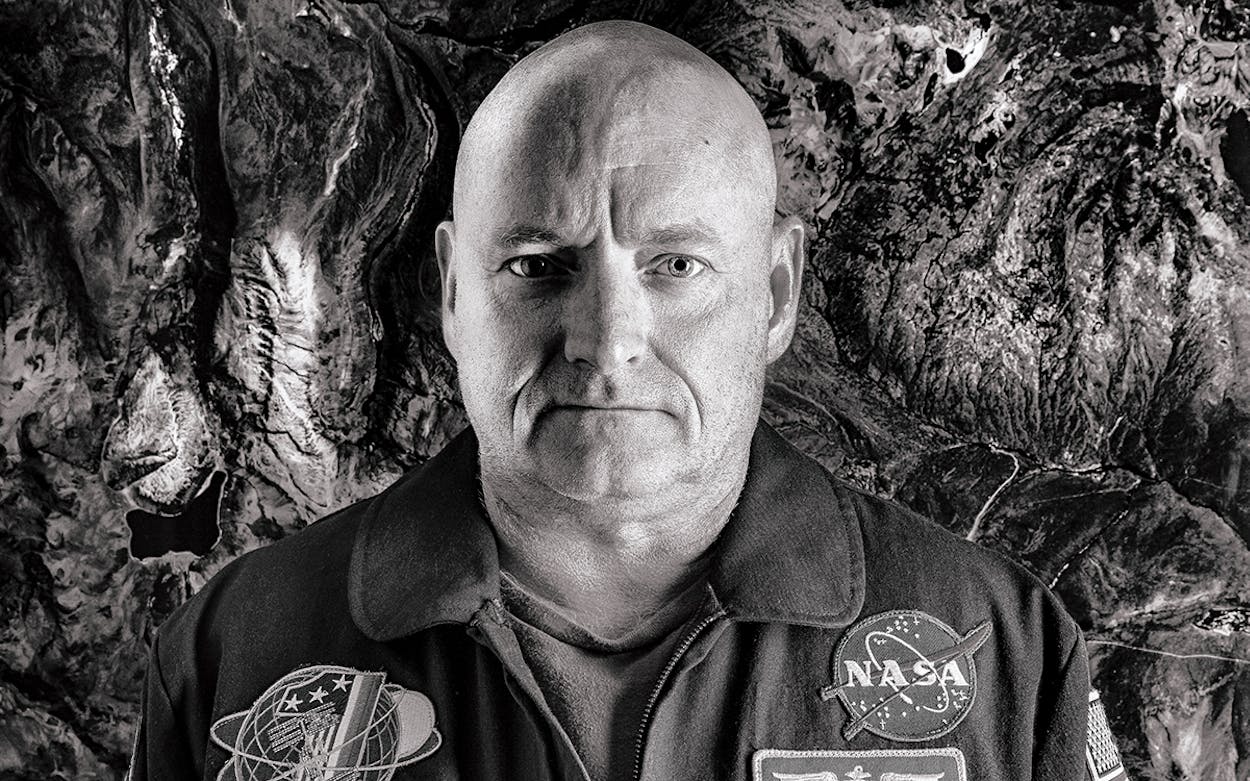This article originally appeared in the October 2017 issue of Texas Monthly with the headline “2015: A Space Odyssey.”
On March 1, 2016, astronaut Scott Kelly returned to Earth after spending 340 days on the International Space Station, a record for an American. During his time aboard, the 53-year-old Houstonian collected data on the effects of long-term weightlessness on the human body and for a study that compared changes in his body to those of his then-earthbound identical twin, astronaut Mark Kelly. While on the ISS, Kelly became a Twitter star, wowing followers with the photos taken from his window. His first book, Endurance: A Year in Space, a Lifetime of Discovery (Knopf), is out October 17.
Katy Vine: Some of the book is personal, though I get the sense that you’re not a natural oversharer. Were the sections about your family hard to write?
Scott Kelly: The way I looked at it is, I’m only going to write this book once, and if you’re not honest about everything, that diminishes the stuff you’re writing about. You’ve gotta say the good and the bad; I think that gives the book more credibility. Was it cringeworthy to read?
KV: Not at all. But I was expecting something more sanitized.
SK: Some astronauts’ biographies gloss over certain things. I was told there’s one astronaut biography that fails to mention that the guy was married for twenty years to a particular person! Just completely left her out! I couldn’t do that. You can’t just make-believe that certain people don’t exist because you don’t like them anymore.
KV: You didn’t hide things that got on your nerves.
SK: I wrote about [fellow astronaut] Tim Kopra saying stuff that was driving me crazy. But, you know, I temper that by saying he’s a great guy. He’s a friend. If someone says they spent a year in space and nothing got on their nerves, they’re lying. So with Tim, I put some of that blame on me. “Maybe it’s just me.” Hopefully he won’t be offended.
KV: Did people read the manuscript and say, “You need to open up more”? Or “You need to open up less”?
SK: Almost exclusively less. The advice I was given was “You sure you wanna say that?” I was like, I don’t know. [Laughs.]
KV: I was fascinated by how much you missed water—showers, pools, the taste of fresh water that hasn’t been recycled. Once you were back on Earth, did that gratitude fade over time? Did you start to take things like water and gravity for granted?
SK: When you get back there’s stuff you appreciate in the beginning, and then after a time you take it for granted, like gravity. How long does that take? Hard to say. How long does it take to feel completely back to normal, physically and psychologically, after being in space for that period of time? I’d say six to eight months.
KV: This scene when you’re about to collide with some space junk à la the film Gravity is pretty alarming, and I don’t think it’s something any of us think about down here. Does it give you nightmares?
SK: Nah.
KV: Really?
SK: At the time, you think, if we get hit, we will be vaporized. There’s no two ways about it; it would be like a nuclear explosion. But it’s not something worth dwelling on.
KV: I was surprised you watched Gravity while you were up there. Why would you do that?
SK: It seemed like a funny thing to do. It was cool, too, because you could compare how the space station looks for real compared to how they portrayed it in the movie. Remarkably close. They did a nice job.
KV: What would be your picky criticism of the movie?
SK: The physics are all wrong. But if you made the physics right, it wouldn’t be as good a movie, so I don’t have a problem with the artistic license that was used.
KV: You say in the book that “we are still learning about the long-term effects of breathing so much carbon dioxide [on the space station]. It may cause cardiovascular problems and may have effects in the future that we don’t yet understand.” Have doctors found any delayed effects on your body from your time in space that surprised them?
SK: There weren’t as many delayed effects as you’d think, but they did find some surprises. They thought my telomeres would have gotten shorter compared to my brother’s, but they saw the exact opposite. That kind of stuff.
KV: Did you have any reactions on Twitter that surprised you?
SK: I was answering questions on Twitter one weekend and President Obama asked me a question. He said, “Do you ever look out the window and just freak out?” and I said, “No . . . I don’t freak out about anything except getting a question from you.” And then Buzz Aldrin jumps in and goes on about how I was only in lower orbit and he went all the way to the moon! So I got trolled by the second man on the moon while talking to the president. That was pretty interesting.
KV: You got interested in NASA because you love risk. Now that you’re back, how do you scratch that itch? Have you found your next project?
SK: Not yet. I’ve been busy with this book, but now that I’m done with it—at least, once the book tour is over—I’m going to have to find something else to do to occupy my time. I don’t know what that is. If you have any ideas, let me know.
This interview has been edited for clarity and length.









